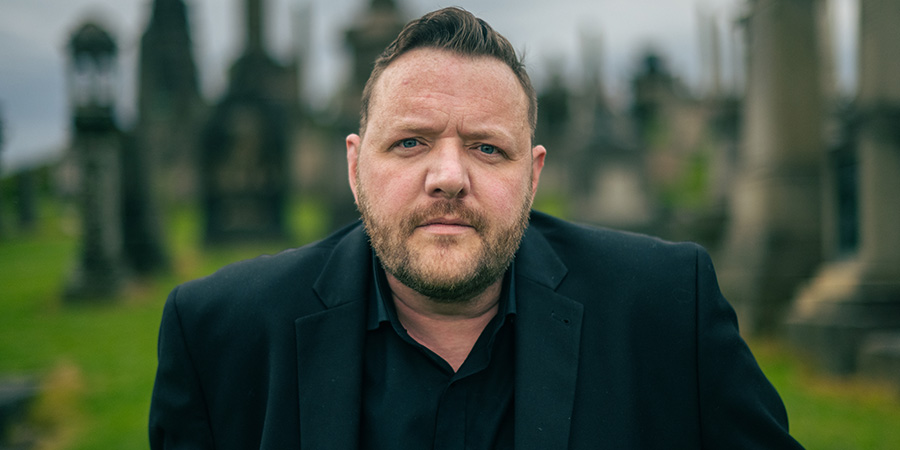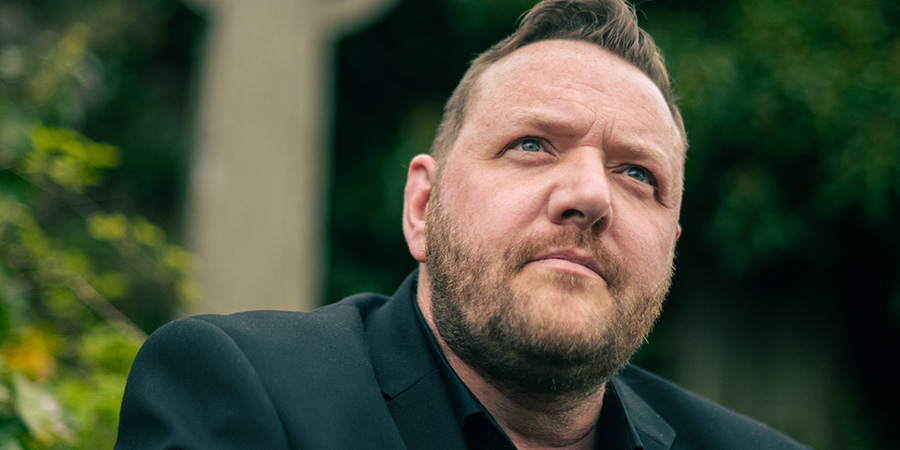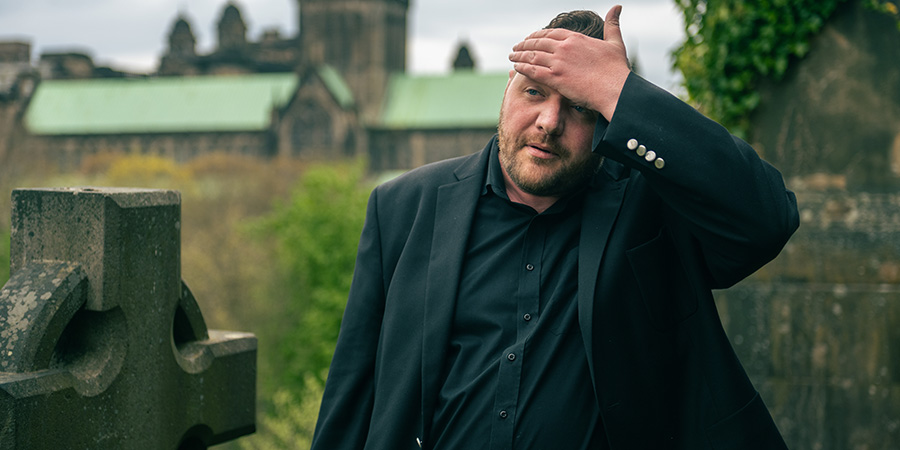My Comedy Career: Scott Agnew

Glaswegian comedian Scott Agnew talks about his career in comedy.
Tell us what you do in your job.
Once upon a time, when I started I was trying to be a "comedian" and say things I thought "comedians" should say in a way that "comedians" would say it and it was pretty poor, it wasn't good. In the background I was having an interesting personal life that I'd never spoken about - I was blossoming into a rather indelicate homosexual whilst trying to manage an undiagnosed cyclical mental health issue and still function/present as a normal human. I was forced to break out of the "comedian" character one night having booked myself to do an hour solo show at the Glasgow International Comedy Festival and, realising I didn't have enough energy or material after ten minutes to be whoever that "comedian" I was trying to be was, I plonked myself on a barstool and started being honest about my own life for the next 45 mins, the way I'd seen Janey Godley and Raymond Mearns do. I essentially performed that way for the next 20 years. I've never done it as well as either Janey or Raymond but I hope they're proud of the 6'5" 26-stone cock-sucking comedy creation they inadvertently produced.
How did you first get involved in the comedy industry?
I suppose that depends on what the qualifying line is for involvement in the industry is. By some measures I've only barely been involved in the industry via BBC Scotland's Breaking The News and now my upcoming show on Radio 4, Dead Man Talking. Does doing some well-reviewed/utterly-trashed Edinburgh Fringe shows count as being involved in this industry? A brief flirtation with an agent once in a whole career? Does having been on the Jongleurs creditors list count as being involved in the industry? Maybe it does.

My first time performing as a stand-up was at the behest of my editor (I was a local newspaper journalist in a previous life) - I was writing about the burgeoning comedy career of my ex-school mate Des Clarke, who had got to the final of So You Think You're Funny? that year and my editor said "why don't you write a piece giving stand-up a go with Des giving you some pointers?" So I did. I donned a bright Hawaiian shirt and braved the stage with some material about church roofs and Rolf Harris's Animal Hospital. It went well and I got the bug for it. Went back the next week and died spectacularly on my hoopla but it's been 24 years since then. Rolf Harris has since had a fall from grace, jailed and is now dead. I am still doing this. Fortunately I've always measured myself against the bottom and there were some atrocious acts going and as long as they persisted - so would I. No one could ever have called me the worst on the circuit. But if some folk had given up much sooner - I'd be nowhere.
What key skills do you need to be able to do your job well?
Listening. Proper actual listening - always, all the time. Our job is to transmit and put stuff out into the world but you need to receive stuff in order to transmit. Get the headphones off when you're travelling/in the local café and keep your pie hole shut in the pub - let the people speak - they'll not be long in saying something that we can all laugh about. As stand-ups we're generally deprived of actual human contact like normal workplaces, so take advantage of the scarce amount of time we get to mix freely in the wild with our fellow humanoids and soak them up.
What has been your biggest career achievement to date?
Comebacks have been my biggest achievement - no one noticed I was gone, nor missed nor cared - but I was "gone" on a couple of occasions. Getting back to the Fringe in 2016 after an HIV diagnosis and three or four years in the wilderness with a crystal meth addiction - that was a big thing. Doing that whole month sober was a huge thing and eventually led to my full drug recovery. Then coming back in 2022 after three cardiac arrests. On both occasions I learned there was no place you couldn't take an audience but you can't be callous or casual about it. You need to hold on to the seriousness of the subjects you're talking about and respect them even in humour - your authenticity will allow the audience to travel with you. As soon as you're banging it out without care it'll backfire on you.
And what has been the biggest challenge/disappointment.
The biggest disappointment in my time in comedy is the industry has developed a flank that takes the talking points and arguments of the opinion pieces, columnists and leader-writers of the right wing press, agrees with them, amplifies them and then pretends that they're the radical anti-establishment. If you're agreeing with the mouthpieces of billionaire press barons and rolling about on the GB News couch taking dark money, pushing the agenda of the Russian state and evangelical Christianity you're really not a rebel, you're a bootlicking foot-soldier and a useful idiot. The alternative comedy movement of the 80s rejected these horrors, challenged their audiences to think and be more accepting and inclusive. Sadly I've watched some friends, colleagues and heroes that would've been proud to be progressive forget or sell out their values and the only progress they're making is towards becoming a fully spoiled ham. We haven't overcome this particular adversity yet but hopefully a battalion of young diverse comics will bring younger diverse audiences that won't stand for this easy, knee jerk populist comedy that deserves to exist forevermore in the purgatory of the GB News studio.

Talk us through a typical day.
Some days I shower - some days I'll go out for milk. But I'm learning to like black tea. Some days I'll write nothing then other times I'll be at the desk writing for ten days straight to the point of ending up with an infected pilonidal cyst requiring a hospital visit and surgery leaving me with a 3 and a half centimetre hole at the top of the crack of my arse.
It's a very mixed bag.
Tell us a trick/secret/resource that you use to make your job quicker/easier.
I spent a year as an outpatient of Leverndale Mental Health Hospital on the southside of Glasgow in 2015. The psychodynamic therapy and the skills it taught me have made everything so much easier. It's not ideal but it's better.
How are you paid?
How vulgar! No one needs to know I'm a broke piece of shit living in a Housing Association flat - stop ruining the glamorous illusion of showbiz. I earn enough to keep me in silk camisoles and kimonos and a fully stocked fridge of Rustlers burgers.
If you could change one thing about the comedy industry, what would it be?
The general rigamarole of the hustle, the begging, the "online journeys". I get it's the way of the world now, I give away a lot - almost everything about myself on stage - but what we offer up on stage should be enough without turning every waking moment of our lives into The Truman Show to punt an extra three tickets in Truro.
What tips would you give for anyone looking to work in your area of the industry?
I'm a terrible example - I never chose this, there was never a plan or a goal or an ambition. I ended up here - and I'm not sure where here is. It was about the only place I could hang on and survive with a serious undiagnosed mental health condition (cyclothymia) and a drug addiction. It allowed me to ping pong around as a mess and kinda keep myself fed and intermittently pay rent until I got a housing association flat. Now I'm a lot more stable to the point of grindingly dull maybe I can start taking it seriously and thinking of it as a career. I'm just beginning, 24 years in and at 43 years of age. Producers hit me up - I've loads of stories to tell.
Scott Agnew: Dead Man Talking aired on BBC Radio 4 during August 2024.
This article is provided for free as part of BCG Pro.
Subscribe now for exclusive features, insight, learning materials, opportunities and other tools for the British comedy industry.



